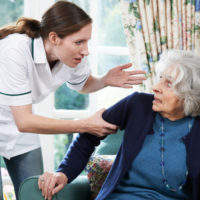Signs that Your Loved One May Be a Victim of Nursing Home Abuse

The US population’s average age is increasing rapidly, and growing with it is the population of the nation’s nursing homes. While many nursing homes provide competent, gentle care to their residents, some are prone to neglecting or abusing residents emotionally, verbally, or physically. Below, find out more information about the problem of elder abuse, and learn to spot potential signs of abuse among your loved ones.
Studies find elder abuse a widespread issue
According to a report by the World Health Organization, abuse of seniors is common. The WHO noted that roughly 1 in 6 seniors was the victim of abuse in 2016. The WHO’s report also shared the results of a survey of nursing home staff and the abuse they witnessed on the job. The survey found that 36% of all staff had witnessed at least one incident of abuse in the previous year. Another 10% admitted that they themselves had committed at least one act of physical abuse in the prior year. The United States’ National Ombudsman Reporting System (NORS) has found that 14,258 individuals filed complaints of abuse, gross neglect, or exploitation experienced in their long-term care facility in 2014 alone.
Know the signs of elder abuse
If you have a parent, spouse or loved one in a long-term care facility or nursing home, you doubtless conducted advance research to find the best facility for your loved one that was at a price your family could afford. However, abuse can occur anywhere—even in facilities with reputations for offering attentive and dedicated care for their residents. This abuse can cause serious psychological harm, as well as have physical consequences. In fact, elder victims of abuse are found to be twice as likely to die prematurely as seniors who haven’t been abused.
In order to ensure your loved one remains free from mistreatment in their senior years, visit them often and keep an eye out for common signs of abuse, such as:
- Bruises, cuts, or welts that your loved one can’t explain
- Bed sores
- Broken bones
- Poor personal grooming or an unkempt appearance
- Signs of depression since entering the facility
- Signs that residential staff are afraid to leave you alone with your loved one
- Weight loss or disinterest in the people and activities that your loved one once enjoyed
If you believe your loved one may have been subjected to abuse in Florida, find out if you should file a lawsuit based on this abuse by contacting the seasoned and knowledgeable West Palm Beach elder law attorneys at Shalloway & Shalloway for a consultation, at 561-686-6200.